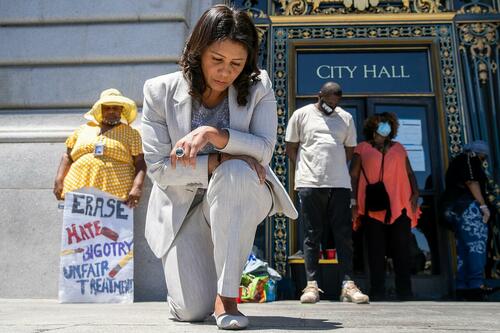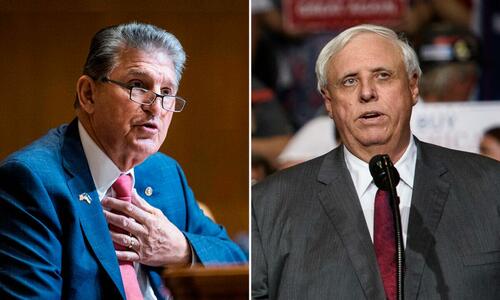Authored by Doug Casey via InternationalMan.com,
Everyone knows that the US government is bankrupt and has been for many years.

Whenever the chattering classes talk about cuts, it’s only about cuts over the course of 10 years. Which is a dodge, a fraud. Partly because most of the supposed cuts will be scheduled for the end of the period, but also because new programs, new emergencies and hidden contingencies are guaranteed to creep in, offsetting any announced cuts. The anticipated $2 trillion deficit for 2024 isn’t a temporary worst case; it’s the rosiest possible scenario.
People thought I was joking when, asked how bad the Greater Depression was going to be, I answered that it would be worse than even I thought it would be. But I haven’t been joking.
To sum up the situation, given its financial condition and the political forces working to worsen it, the US government is facing a completely impossible and irremediable situation.
The problems we face are one hundred percent caused by the US government – not by bankers or brokers, although they have been complicit.
Recall what government is: an organization with a monopoly of force within a certain geographical area. Its purpose is, ostensibly, to protect the inhabitants of its bailiwick from the initiation of force. That implies three functions: an army to protect against aggressors coming from outside of its borders, police to protect citizens from aggressors inside its borders and a court system to allow citizens to adjudicate disputes without resorting to force.
Assuming you’re going to have a government, it’s important to limit it strictly, lest it get completely out of control – it’s got a monopoly of force, after all – and overwhelm the society it’s supposed to protect.
Here I want you to distinguish government from society. They are not only two totally different things, but are potentially antithetical to each other. This is because the essence of government is force, not voluntary cooperation. Everything that people think the government provides (beyond some forms of protection) is really provided by society, or with resources the government has taken from society. It’s critical to understand this, or you won’t see the slippery slope the US is now sliding on.
Is there any chance that the US government can reform and go back to a sustainable basis at this point?
I’d say no.
Past is Prologue
Its descent started in earnest with the Spanish-American War in 1898, when it acquired its first foreign possessions (Cuba, the Philippines, Puerto Rico, etc).
It accelerated with the advent of the income tax and the Federal Reserve in 1913. It accelerated further with World War I, when the government took over the economy for 18 months.
The New Deal and World War II made the state into a permanent major feature in the average American’s life.
The Great Society made free food, housing and medical care a feature.
The final elimination of any link of the dollar to gold in 1971 ensured ever-increasing levels of currency inflation.
The Cold War and a series of undeclared wars (Korea, Viet Nam, Afghanistan and Iraq, among others) cemented the military in place as a permanent focus of the government. And since 9/11, the curve has gone hyperbolic with the War on Terror.
It’s been said that war is the health of the state. We have lots more war on the way, and that will expand the state’s spending. But the Greater Depression will be an even bigger drain, and it will likely destroy the middle class, as an unwelcome bonus.
In all that time, from 1898 to today, there have been no substantial retrenchments of the US government, and the situation is getting worse, on a hyperbolic curve. Trends in motion tend to stay in motion until a genuine crisis changes them, and this trend has been gaining momentum for over a century.
The Death of the Middle Class
Let’s divide people into three classes – rich, poor and middle class.
-
Rich people are going to be okay. They can bribe the politicians to change the laws, hire the lawyers to interpret the laws, the accountants to limit their liabilities, advisors to help them profit from distortions and travel agents to get them out of Dodge. They may get eaten later, but for the moment, don’t worry about them.
-
The poor don’t have much to lose, and the government is going to keep throwing benefits at them to keep them happy. That’s a shame because it cements them to the bottom as poor people – but that’s a topic for another day.
-
The real danger is to the middle class, and it’s a serious matter because the US is a middle-class society. These are people who try to produce more than they consume and save the difference, in order to grow wealthier. That formula has worked well up to now – but almost everybody saves dollars. What happens, however, if the dollars are destroyed? It means that most of what they saved disappears, and most of the middle class will disappear with it, at least for that generation. They’ll be very unhappy, and they’ll be up for some serious changes.
What Happens Next
My point is that there really is no conventional solution to the US government’s financial crisis. It’s reached a stage where it will either have to start defaulting on some of its obligations, or vastly increase its rate of money printing. You decide which. The only questions are political; the economics are quite clear. Money printing it is. Especially since the Jacobins who now control Washington are believers in Modern Monetary Theory.
It won’t be the end of the world when the US government goes bust, although it will certainly have plenty of inconveniences and unpleasantness. Lots of governments have gone bankrupt before, some of them numerous times – like all of them here in South America, where I am at the moment.
In fact, there’s a temptation to look forward to it, since the state is the enemy of any decent human. One might hope that when they bankrupt themselves, we might get to live in a libertarian paradise. But that’s not likely the way things will come down; rather, just the opposite. Not all State bankruptcies are just temporary upsets. Most of the great revolutions in history have financial roots.
Great revolutions are more than just unpleasant and inconvenient; they’re extremely dangerous.
The French Revolution of 1789 was brought on by the financial collapse of the French government. It was a good thing to depose Louis XVI, but things didn’t get better – they got much, much worse with Robespierre and then Napoleon.
The collapse of the Czar’s regime in Russia in 1917, bankrupted by WW1, seemed to be good news at first – but then things got worse under Lenin, and stayed worse for a long time. In Germany, the destruction of the German mark in 1923 set the stage for the Nazis – and then the depression ushered them in.
The fact is that when a government collapses, especially when the government is providing all the things the US government does today, people want somebody to fix it; they want their goodies back.
It’s well known that over 50% of the US population are net recipients of state largesse. And the degree of state support and involvement in the US today is far, far greater than it was in France, Russia or Germany. After a period of chaos, it’s always the people who are most political, who have the most rabid statist ideas, who get the public’s attention and rise to the top.
It seems highly likely that the US will get a savior, someone full of bravado, who assures the booboisie that he can straighten things out – if he is given sufficient power. Perhaps it will be an arrogant windbag, perhaps some narcissistic general. The government won’t wither away; it will reassert itself. I don’t see any way around it, actually.
We are already moving into a police state. But, on the bright side, it’s a police state with a fairly high standard of living, one with Walmarts, McDonalds, and SUVs – at least for the time being.
But rest assured that if the situation evolves the way I expect, the standard of living will drop steeply, financial markets will become chaotic, and the US will become quite repressive. I’ll bet you money on this. In fact, I am betting money on it.
But what can you do about it? Well, actually, there is nothing you can do about it. At least as far as changing the course of history is concerned. The best you can do is to speculate intelligently on new distortions that will be cranked into the system, as well as others that will be liquidated.
It seems to me that this trend can no longer be reversed. The US government’s budget is, in fact, the biggest thing in the world. It won’t be turned around, because it is like a gigantic snowball rolling down a hill. It will only stop when it smashes into the village at the bottom of the valley.
The best thing you can do is capitalize on it as best you can. And get out of its way while you do.
* * *
We’re on the cusp of a global economic crisis that could eclipse anything we’ve seen before. Most people won’t be prepared for what’s coming… That’s precisely why bestselling author and legendary speculator Doug Casey and his team just released this urgent PDF report on how to survive and thrive in this chaotic environment. Click here to download it now.










